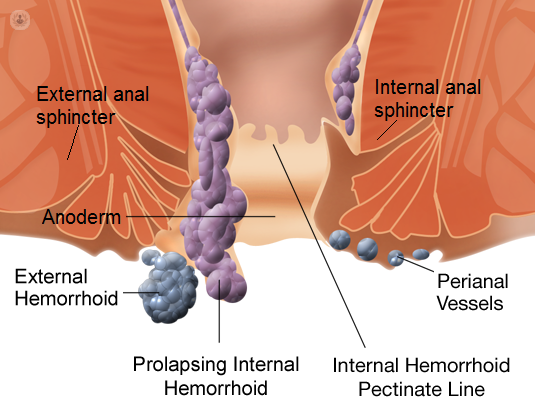Hemorrhoids: types, symptoms and forms of presentation
Written by:Hemorrhoids occur with inflammation of veins in the rectum, which tend to bleed, prolapse, or both at once. Despite being a very common disease today, many of those affected suffer them in silence and take years to notify your doctor.
Type of hemorrhoids
 The also called piles are distinguished into two types, depending on your location.
The also called piles are distinguished into two types, depending on your location.
- Internal hemorrhoids: they are located inside the anus, and displayed with pain, bleeding and prolapse on defecation. If you just completely out of the rectal canal, producing pain is very intense.
- Hemorrhoids: are located around the anus, covered by a thin, sensitive skin whose rupture causes bleeding of variable level. They may also contain a blood clot inside, producing an intense and acute pain.
Risk Factors for Hemorrhoids
Specialists in General Surgery know the exact cause of hemorrhoids, but agree on the existence of risk factors that increase its occurrence. Age, genetic predisposition, chronic constipation, pregnancy and even spend a lot of time sitting in the bathroom are some examples. They all favor the relaxation of the anal tissue, causing dilation of veins and weaken the area.
How are hemorrhoids occur?
- Hemorrhoidal crisis: hard stools or a poor diet (too much spicy foods, salt, alcohol or caffeine) increase the size of the veins, causing a severe and constant pain.
- External hemorrhoidal thrombosis: breakage of one of the swollen veins, causing the appearance of a clot in the year, a lot of pain and a small hardness (node) violet.
- Hemorrhoidal prolapse: happens when the veins of the anus come out of it and be reintroduced manually or by surgery.
¿Hemorrhoids or colon cancer?
Many of the patients suffering from this condition may be alarmed to find that their symptoms are assimilated to colon cancer. However, it notes that these are unrelated: a hemorrhoids do not degenerate in colon cancer. Anyway, so it calls your doctor or colorectal surgeon when these symptoms occur.


